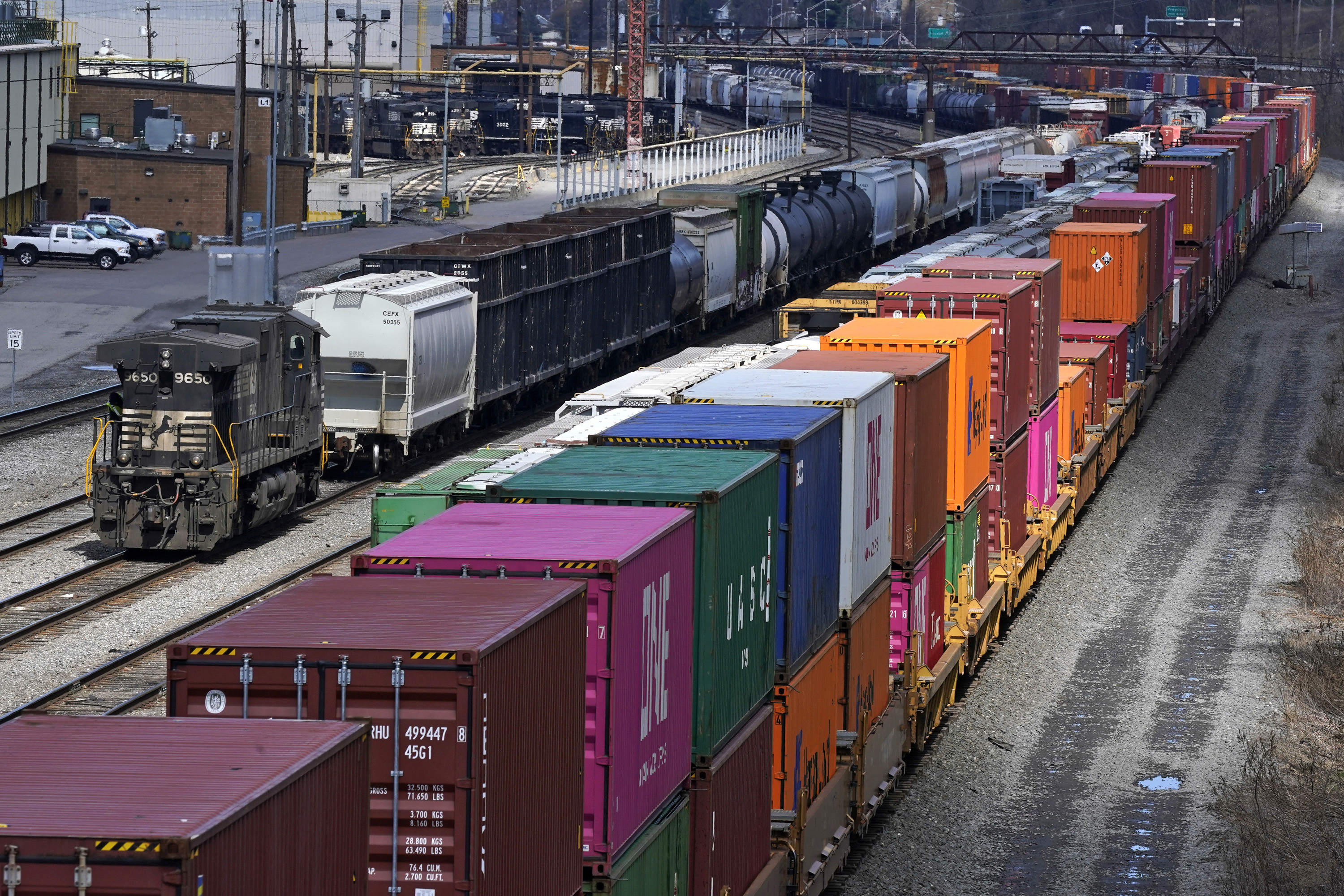
President Joe Biden reminded Americans he is a “pro-union” president Tuesday as he toured a technology plant to highlight a $300 million expansion, just a day after he sided with business leaders in asking Congress to pass legislation to stave off a crippling rail strike.
The South Korean company SK Siltron is expected to quadruple its production in the coming years at the plant. It's the latest in a series of massive foreign investments in the U.S. manufacturing and technology sectors trumpeted by Biden amid a push by his administration to on-shore production of key components and products, after the COVID-19 pandemic pushed long-simmering supply chain issues to the brink.
Biden said, as he often does, that he's been pro-union his entire career, and he'd talked with SK leaders about how American workers were "the best workers in the world, you’re the most qualified workers in the world.”
“The middle class built America, and unions built the middle class,” he said.
Get Tri-state area news and weather forecasts to your inbox. Sign up for NBC New York newsletters.
His support of unions is a staple of his speeches from warehouses and construction sites around the county. But on Tuesday, it came as he was appealing to lawmakers to override union concerns to prevent a rail strike after an earlier deal Biden helped broker started to fall through. Four of the 12 unions have refused to ratify the agreement, stalling talks and pushing Biden and congressional leaders to get involved to stop what they have said would be a crippling strike during the holiday season. Eight of the unions have ratified the deal.
Biden met with leaders of both parties shortly before leaving Washington for Michigan, and said he was confident they could avoid a strike. House Speaker Nancy Pelosi, D.-Calif., said they'd put legislation forth Wednesday and Senate Majority Leader Chuck Schumer, D-N.Y., said he'd get a vote “ASAP.”
In Michigan, Jeffery Dukes, a member of United Association Local 85, praised Biden before the president's remarks at the plant.
“President Biden has been committed since day one to fight for the working families of Michigan and thanks to his leadership, American manufacturing is expanding like never before,” Dukes said, adding there was never a better time to be a union member.
Biden highlighted historic investments in manufacturing, saying “we did so much that no one knows the effects of it yet," and touted his efforts to lower gas prices.
“It’s part of a broader story about the economy we’re building that works for everybody,” he said.
He has sought to boost his political fortunes with his attendance at groundbreakings and other ceremonies highlighting investments in U.S. manufacturing and technology, as he tried to help Democrats in the 2022 midterms and now as he eyes a repeat run for the White House in 2024.
Biden appeared with Gov. Gretchen Whitmer, a Democrat who just won reelection in a closely watched race. Whitmer's double-digit margin of victory over Tudor Dixon, a Republican who had denied the 2020 election results, has burnished her standing within her party.
“People want to come and invest here,” Biden said as he toured the factory. “We exported more jobs than products. Now we’re back in the business of exporting products, not jobs.”
Saying a railroad strike would "devastate our economy," Biden on Monday asked Congress to intervene before next month’s deadline in the stalled contract talks, and House Speaker Nancy Pelosi said lawmakers would take up legislation this week to impose the deal that unions agreed to in September.
Pelosi said the House would not change the terms of the September agreement, which would challenge the Senate to approve the House bill without changes.
The September agreement that Biden and Pelosi are calling for is a slight improvement over what the board of arbitrators recommended in the summer. The September agreement added three unpaid days off a year for engineers and conductors to tend to medical appointments as long as they scheduled them at least 30 days in advance. The railroads also promised in September not to penalize workers who are hospitalized and to negotiate further with the unions after the contract is approved about improving the regular scheduling of days off.
Hundreds of business groups had been urging Congress and the president to step into the deadlocked contract talk and prevent a strike.
Both the unions and railroads have been lobbying Congress while contract talks continue. If Congress acts, it will end talks between the railroads and four rail unions that rejected their deals Biden helped broker before the original strike deadline in September. Eight other unions have approved their five-year deals with the railroads and are in the process of getting back pay for their workers for the 24% raises that are retroactive to 2020.
Related Coverage:
If Congress does what Biden suggests and imposes terms similar to what was agreed on in September, that will end the union’s push to add paid sick time. The four unions that have rejected their deals have been pressing for the railroads to add that benefit to help address workers’ quality of life concerns, but the railroads had refused to consider that.
The business groups led by the U.S. Chamber of Commerce, National Association of Manufacturers and National Retail Federation said even a short-term strike would have a tremendous impact and the economic pain would start to be felt even before the Dec. 9 strike deadline. They said the railroads would stop hauling hazardous chemicals, fertilizers and perishable goods up to a week beforehand to keep those products from being stranded somewhere along the tracks.
“A potential rail strike only adds to the headwinds facing the U.S. economy,” the businesses wrote. “A rail stoppage would immediately lead to supply shortages and higher prices. The cessation of Amtrak and commuter rail services would disrupt up to 7 million travelers a day. Many businesses would see their sales disrupted right in the middle of the critical holiday shopping season.”



